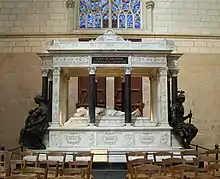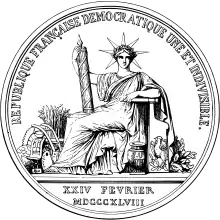Louis Juchault de Lamoricière
Christophe Léon Louis Juchault de Lamoricière (5 September 1806 – 11 September 1865) was a French general.
Christophe Léon Louis Juchault de Lamoricière | |
|---|---|
 | |
| Born | 5 September 1806 Nantes, France |
| Died | 11 September 1865 (aged 59) Prouzel, France |
| Allegiance | |
| Years of service | 1828-1851; 1860 |
Early life
Lamoricière was born in Nantes. He studied at the Ecole Polytechnique and the Ecole d'Application.
Service
He was commissioned a sub-lieutenant in the Engineers in 1828.
In Algeria
He served in the Algerian campaigns from 1830 onwards, being made a captain of Zouaves.[1] By 1840, Lamoricière had risen to the grade of maréchal-de-camp (major-general). Three years later he was made a general of division. He was one of the most distinguished and efficient of Bugeaud's generals, rendering special service at Isly (14 August 1844). He acted temporarily as governor-general of Algeria, and finally effected the capture of Abd-el-Kader in 1847.[2]
Lamoricière played a part in the political events of 1848, both as a member of the Chamber of Deputies and as a military commander. Under the regime of General Cavaignac he was for a time minister of war (28 June – 20 December 1848).
In the French Second Republic
From 1848 to 1851 Lamoricière was one of the most conspicuous opponents of the policies of Louis Napoleon, and following the coup d'état of 2 December 1851 he was arrested and exiled.[2] Lamoricière refused to give his allegiance to the new Emperor Napoleon III.
In service to the Pope
In 1860 he accepted command of the papal army, which he led in the Italian campaign of 1860.[1] On 18 September that year, he was severely defeated by the Italian army at Castelfidardo.[2]
Retirement
His last years were spent in complete retirement in France where he had been allowed to return in 1857.

Death and tomb
He died at Prouzel (Somme) in 1865.[2] His tomb at Nantes Cathedral, designed by Paul Dubois, was completed in 1875.[3]
References
- Delamarre 1913.
- Chisholm 1911, p. 131.
- Harpers Magazine. 76. Harper's Magazine Co. 1888. p. 246.
- Attribution
- Delamarre, Louis N. (1913). . In Herbermann, Charles (ed.). Catholic Encyclopedia. New York: Robert Appleton Company.CS1 maint: ref=harv (link)
 This article incorporates text from a publication now in the public domain: Chisholm, Hugh, ed. (1911). "Lamoricière, Christophe Léon Louis Juchault de". Encyclopædia Britannica (11th ed.). Cambridge University Press.
This article incorporates text from a publication now in the public domain: Chisholm, Hugh, ed. (1911). "Lamoricière, Christophe Léon Louis Juchault de". Encyclopædia Britannica (11th ed.). Cambridge University Press.- E. Keller, Le General de Lamoricière (Paris, 1873).
External links
| Political offices | ||
|---|---|---|
| Preceded by Louis-Eugène Cavaignac |
Minister of War 28 June 1848 – 20 December 1848 |
Succeeded by Joseph Marcellin Rulhières |

